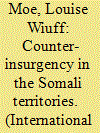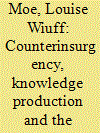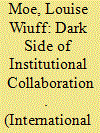|
|
|
Sort Order |
|
|
|
Items / Page
|
|
|
|
|
|
|
| Srl | Item |
| 1 |
ID:
158712


|
|
|
|
|
| Summary/Abstract |
This article explores how contemporary counter-insurgency and peacebuilding converge around a pragmatic interventionary discourse that reinvents historical pacification practices centred on bottom-up support for local coercion wielders and securitized institution-building. The analysis combines a historical perspective on the changing position and meaning of peace in relation to counter-insurgency with an exploration of contemporary articulations of war with peace in interventions in the Somali context. Through analyses of the cases of Jubaland and Somaliland—two sites where counter-insurgency has adapted to the limitations of state-centric stabilization by instead targeting institutions and actors beyond the host nation government—the article explores how contemporary counter-insurgency embeds itself within the legitimating vocabulary of peace and bottom up reconstruction, and draws on the operational tools provided by peacebuilders. Moreover, it demonstrates how these tools are thereby reframed in such a way that their stated peacefulness is subjugated to counter-insurgency campaign objectives—with far from peaceful effects on local orders. By teasing out these effects through empirical examples, and by offering a historical contextualization of the examples, the article reappraises understandings of contemporary counter-insurgency as a benevolent and locally-sensitive approach to defeating ‘subversion’ and installing peace—instead it conveys the marked resemblance to colonial and Cold War efforts of pacification. This highlights the importance of closely examining the specific geopolitical and policy contexts in which the terms of the debate on bottom-up peace circulate, as well as the different intervention agendas with which such proposals become entwined.
|
|
|
|
|
|
|
|
|
|
|
|
|
|
|
|
| 2 |
ID:
159965


|
|
|
|
|
| Summary/Abstract |
Counterinsurgency witnessed a powerful revival in our post-9/11 world. With its focus on the control of territory, populations and seemingly less kinetic hearts and minds campaigns—as well as a good dose of liberal humanitarianism—contemporary counterinsurgency has become the dominant form of the Western military interventionism. While most of the associated debates focus on the potentials and pitfalls of Western counterinsurgency approaches, the role of South-South cooperation in the making of ‘Global Counterinsurgency’, and the related emerging geopolitical convergences of interest between Western and non-Western elites in counterinsurgency, has received little attention. In focusing on counterinsurgency-related forms of knowledge production, and by analyzing the role of transnational military knowledge entrepreneurs promoting a form of coercive Realpolitik that supports ‘locally owned’ elite-driven counterinsurgency efforts in the field of South-South military cooperation between Colombia and Somalia, this article addresses this void. We show that conventional North/South divides no longer capture the realities of counterinsurgent warfare going global and call for a de-centering of the study of military interventions that is sensitive to how knowledge production in regards to ‘Global South’ contexts not only makes them legible, and thereby more governable, but also how this knowledge production informs ongoing reconfiguration of interventions themselves.
|
|
|
|
|
|
|
|
|
|
|
|
|
|
|
|
| 3 |
ID:
177846


|
|
|
|
|
| Summary/Abstract |
Within the field of international peace and security, policy makers and analysts alike commonly treat collaboration and convergence among international organizations and intervention frameworks as a policy objective in itself. Indeed, from the focus on the ‘comprehensive approach’, during the 2000s, to the recent emphasis on multi-dimensional and integrated stabilization frameworks, institutional collaboration is cast as inherently positive and desirable in regard to addressing international collective matters. This article challenges such ‘collaboration bias’. It does so by exploring the empirical effects of increasing collaboration and ‘strategic partnerships’ within the context of the current (re)turn to stabilization interventions. Specifically, focusing on Mali, it unpacks how contemporary stabilization efforts intensify collaboration across counterterrorism and peacekeeping interventions in ways that undercut policy implementation within one of the most central peacekeeping priority areas, namely the Protection of Civilians (PoC). In detailing key aspects on which contemporary peacekeeping-counterterrorism entanglements compromise protection efforts, the article conveys some of the ‘dark sides’ of cooperation regimes. It moreover highlights the need to not only explore regime complexity as a systemic feature of world politics but also unpack how it operates, and to what effect, at the meso and micro levels of policy implementation and practice.
|
|
|
|
|
|
|
|
|
|
|
|
|
|
|
|
|
|
|
|
|